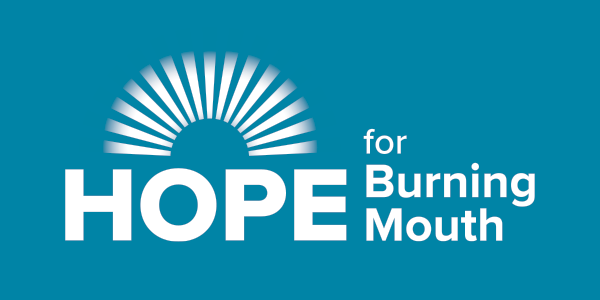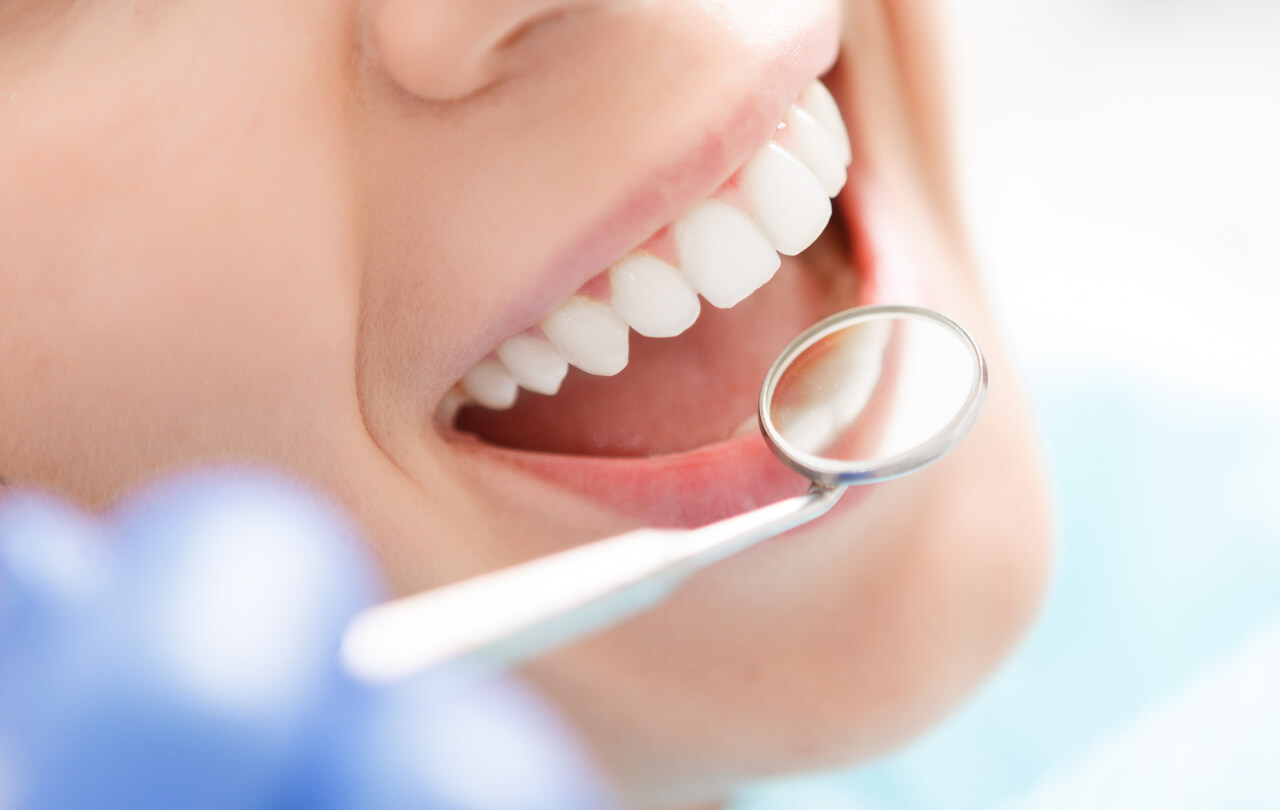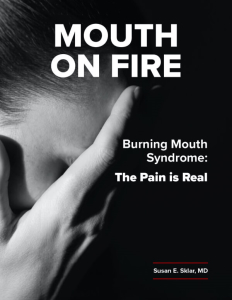9 Causes of Mouth Pain You Should Know About
Secondary Burning Mouth Syndrome
This article is about some of the secondary causes of Burning Mouth Syndrome. While there is some debate about what is a primary cause and what is secondary these nine causes can be recognized by history or clinical findings. Yes, that means your doctor can figure out the reason your mouth is burning.
A recent paper in the Journal of Practical Pain Management the authors list reasons for the pain of Burning Mouth Syndrome. Here are their reasons:
Drugs ……………………………….2%
Fungal …………………………….21%
Psychogenic ……………………37%
Geographic tongue …………26%
Multiple causes ………………12%
This has not my experience treating BMS patients. By the time a patient enters my practice most of the obvious causes have been diagnosed and treated. The troubling thing is the almost 40% of patients who are written off as having a psychogenic cause. Many suffers of BMS are told the pain is in their head and they are sent to a psychiatrist. This can be devastating for many people who are experiencing real pain and are told they are crazy.
Anna a patient with mouth pain. Is this Primary Burning Mouth Syndrome?
The first time I met Anna, she complained that mouth pain was not only interfering with her ability to enjoy the foods she loved, but with her ability to sleep and even enjoy life. She suspected that she had Burning Mouth Syndrome, based on her symptoms and what she had read online, and she was afraid that she might have a long journey ahead before she could return to cooking for her family again.
On further examination, however, we found that Anna did not have Burning Mouth Syndrome at all.
Over the course of several visits, I found that she often noticed symptoms of reflux on first waking up in the morning, regardless of what she had eaten before she went to bed. Once we identified the reflux she suffered overnight, we were able to treat those symptoms, and the burning pain her mouth went away along with it.
Ongoing mouth pain can cause serious complications in many areas of your life. Many victims with mouth pain struggle to reconcile their symptoms and live normally. If, like Anna, you’re suffering from ongoing mouth pain, you may worry about Burning Mouth Syndrome and other serious disorders. The truth is, however, there are many conditions that can issue similar symptoms, including conditions that are far easier to treat than Burning Mouth Syndrome.
A Look at Burning Mouth Syndrome
Burning Mouth Syndrome is defined as a burning sensation that occurs without any obvious reason. Burning Mouth Syndrome patients do not have identifiable oral lesions like sores in the mouth. They often do not have laboratory findings that explain their pain. Pain from burning mouth syndrome gets described several ways:
- Burning
- Tingling
- Tender
- Hot
- Scalding
- Numb
Often, multiple sites in the mouth are involved. The most common areas impacted by Burning Mouth Syndrome, however, are the front two thirds of the mouth and the tip of the tongue.
If you have symptoms of burning mouth syndrome, hormonal treatments can help restore your quality of life and relieve your pain. However, Burning Mouth Syndrome is not the only cause of oral pain. Ruling out and/or treating other symptoms can make it easier for you to address your mouth pain. Consider these symptoms when determining whether you might have burning mouth syndrome.
1. Do you have a white coating on your tongue?
Oral yeast, also known as thrush, is a fungus that coats the mouth and tongue. It often causes burning or pain. The yeast that causes thrush, also known as Candida, occurs in many areas of the body naturally. In fact, it normally gets found in the mouth. However, yeast overgrowth can cause symptoms of thrush.
The most noticeable symptom of thrush is white patches on the cheeks, tongue, and roof of the mouth. However, patients may also notice redness, swelling, or a cotton-like feeling in the mouth. Patients may notice an increase in pain when eating or swallowing. They may also notice a loss of the sense of taste. If you have these symptoms alongside the burning pain in your mouth and/or throat, it could be a sign of thrush.
As a functional medicine doctor, Dr. Sklar looks at the whole person. We know that there is a gut-mouth connection. There may be yeast in an unhealthy intestinal tract that is causing yeast in the mouth. Restoring the health of the gastrointestinal tract may be the solution to recurrent episodes of thrush. Luckily, there are many medications that can quickly and easily treat this condition. You will need to see your doctor to get a prescription for thrush.
2. Are there tiny blisters in your mouth or tongue?
Viral infections, including herpes and shingles, can cause burning pain like what patients experience with burning mouth syndrome. Most often, these viral infections present with tiny blisters in the mouth that cause burning pain when touched or when you eat. You may also notice ongoing pain from some of these blisters.
Most often, patients get oral herpes by kissing or engaging in oral sex with someone who has an active outbreak. Most of the time, herpes is not transmitted when the patient does not have an active outbreak. However, once you have it, it can recur regularly, especially during periods of stress. Usually, the initial outbreak is the worst. It can include fever and severe headache along with the sores. Later outbreaks usually include mild sores around the lips.
3. Do you have lacy white patches in your mouth or on your tongue?
Lichen planus, an autoimmune disease, can cause painful white patches and sores. It usually appears as lacy, slightly raised white patches, but may also appear in a rectangular pattern. Lichen planus can impact not only the mouth, but also the esophageal and vaginal mucosa. Some scientists believe that lichen planus may be caused by an autoimmune disorder in which the body’s white blood cells attack these tissues, but they need more research before determining definitively what causes these conditions. In severe cases, lichen planus may cause ulcers in the mouth. Patients who have mouth ulcers may experience pain even when they aren’t eating or drinking.
4. Do you have mouth sores?
Bechet’s disease is another autoimmune disease that can affect many organs in the body. Mouth sores occur commonly in patients with Bechet’s disease. These sores, called aphthous ulcers, can occur throughout the mouth: on the cheeks, tongue, roof of the mouth, lips, and even tonsils. Most of the time, individual sores heal within a couple of weeks, but they can reoccur. These painful canker sores often appear as the first sign of Bechet’s disease, and may serve as an identifying marker as doctors work to find a diagnosis.
5. Do you have dry mouth? Do you have dry eyes? Have you been diagnosed with an autoimmune disease?
A feeling of dry mouth is quite common with Burning Mouth Syndrome. With Burning Mouth Syndrome, however, actual production of saliva remains normal. If you have low salivary flow, you may have an autoimmune disorder called Sjogren’s disease. Due to its impact on the exocrine glands, including the salivary glands, Sjogren’s disease may cause:
- Dry mouth
- Dry eyes
- Diminished taste and smell
- Decreased saliva production
- Arthritis symptoms
If you have Sjogren’s disease, you may notice that you need water or another liquid to help you swallow dry food, even when you should be able to swallow it on your own.
6. Do you have gastrointestinal reflux or laryngeal pharyngeal reflux?
If you have reflux, it can cause the acidic contents of your stomach to backflow into your esophagus and larynx. This, in turn, can cause burning to the throat, mouth, and tongue, since these tissues are not intended to deal with such acidic contents. Reflux can occur for a variety of reasons, including food sensitivities or breathing problems during sleep. Sometimes, you may not notice the symptoms of reflux while you are awake, or you may wake up noticing burning sensations on the stomach and tongue.
7. Are you on blood pressure medications?
Blood pressure medications are intended to address underlying high blood pressure symptoms. Unfortunately, they can also bring significant side effects. Some people find that blood pressure medications can cause symptoms that mimic those of burning mouth syndrome. Specifically, the ACE (angiotensin-converting-enzyme) inhibitors seem to cause this problem in some patients. The medications known to cause this problem end in “pril” and have names like lisinopril or captopril. A change to another medication solves the problem for many people.
Any time you have new or unusual symptoms after starting a new medication, you should discuss these issues with your doctor. This especially applies if the symptoms cause problems that interfere with your daily functions or sleep. Burning pain in your mouth should be addressed quickly before those symptoms grow worse.
8. Do you have diabetic neuropathy?
Many patients with diabetes notice a number of symptoms that seem, at first, to be unrelated to their diagnosis. Diabetes can cause nerve damage due to high circulating blood sugars. This damage usually affects the feet and legs with numbness and burning. However, the tongue can be involved in the burning pain. Patients may notice intense, burning pain in the mouth or discover a loss of taste and burning sensation.
9. Do you get a red line when you scratch your arm with your fingernail?
When most people scratch their arm lightly with a fingernail, the scratch quickly turns white, with relatively little evidence left behind. A red line when you scratch could indicate the activation of mast cells in the skin. Mast cells release histamine and cause redness and swelling that can occur with light contact.
Some authorities believe that mast cell activation can also cause pain and burning in the mouth. For these patients, antihistamines can help treat the burning sensation. Mast cell activation may also cause symptoms like:
- Rapid pulse
- Low blood pressure
- Passing out unexpectedly
- Itching
- Hives
- Swelling
- Skin redness
- Wheezing
- Shortness of breath
- Diarrhea and vomiting
Do You Have Burning Pain in the Mouth or Other Symptoms of Burning Mouth Syndrome?
If you have burning pain in your mouth or other pervasive symptoms of Burning Mouth Syndrome, you need to work with a doctor who has experience treating the disorder. Many patients suffer for years while they work to achieve a resolution to their symptoms.
At Sklar Center for Restorative Medicine, I have seen many patients who have symptoms of Burning Mouth Syndrome or other causes of mouth pain, and I have helped many of those patients achieve a satisfactory resolution to their symptoms, including treatment of other underlying symptoms and problems.
Contact me today to learn more about the treatment options available for mouth pain.
References for healthcare professionals and visitors to my site who want more in-depth information
- Centers for Disease Control and Prevention
Candida infections of the mouth, throat, and esophagus
Centers for Disease Control and Prevention.
LINK: Candida infections of the mouth, throat, and esophagus - Hopkins Medicine
Oral Herpes
Health
LINK: Oral Herpes - N. Burkhart and the AAOM Web Writing Group
Oral Lichen Planus
American Academy of Oral Medicine Updated September 2013
LINK: Oral Lichen Planus - N Lavanya, P Jayanthi, Umadevi K Rao, and K Ranganathan
Oral lichen planus: An update on pathogenesis and treatment
J Oral Maxillofac Pathol 2011 May-Aug; 15(2): 127–132.
LINK: Oral lichen planus: An update on pathogenesis and treatment - Medline Plus
Behçet disease
Medline Plus
LINK: Behçet disease - Alana M. Nevares, MD
Sjögren Syndrome
Merck Manual Content last modified Feb 2020
LINK: Sjögren Syndrome - F Mosca, V Rossillo, and CA Leone
Manifestations of gastro-pharyngo-laryngeal reflux disease
Acta Otorhinolaryngol Ital 2006 Oct; 26(5): 247–251.
LINK: Manifestations of gastro-pharyngo-laryngeal reflux disease - Xavier Castells, Isidre Rodoreda, Consuelo Pedrós, Gloria Cereza, and Joan-Ramon Laportea
Dysgeusia and burning mouth syndrome by eprosartan
BMJ. 2002 Nov 30; 325(7375): 1277.
LINK: Dysgeusia and burning mouth syndrome by eprosartan - Paul A.Moore, James Guggenheimer, Trevor Orchard
Burning mouth syndrome and peripheral neuropathy in patients with type 1 diabetes mellitus
Journal of Diabetes and its Complications Volume 21, Issue 6, November–December 2007, Pages 397-402
LINK: Burning mouth syndrome and peripheral neuropathy in patients with type 1 diabetes mellitus - Lawrence B Afrin
Burning mouth syndrome and mast cell activation disorder
Oral Surg Oral Med Oral Pathol Oral Radiol Endod 2011 Apr;111(4):465-72.
LINK: Burning mouth syndrome and mast cell activation disorder
Download Dr. Sklar’s Free Ebook




